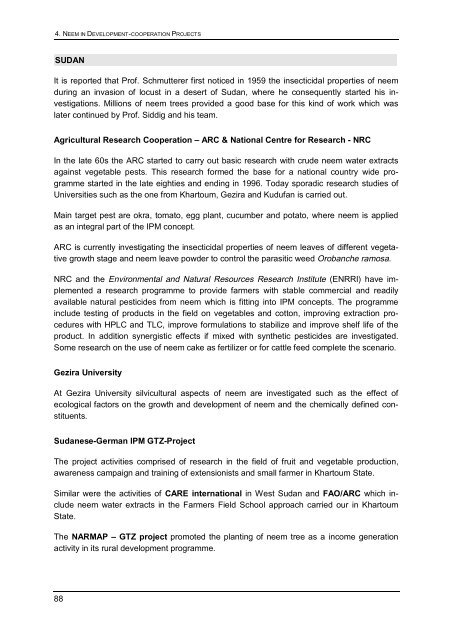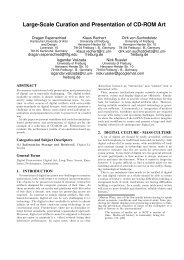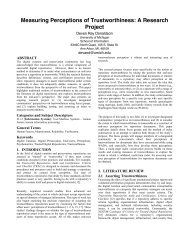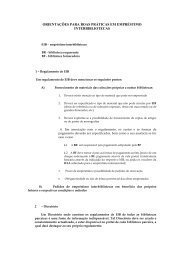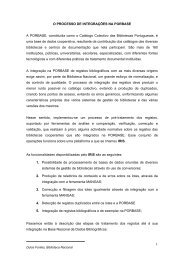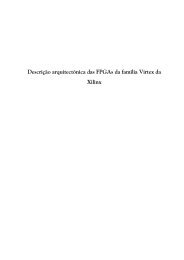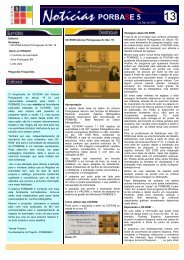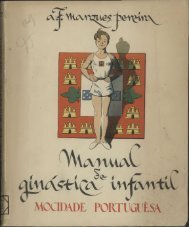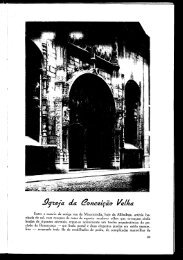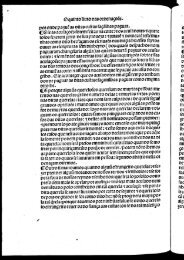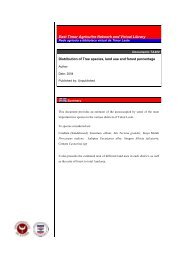Status report on global Neem usage - Biblioteca Nacional de Portugal
Status report on global Neem usage - Biblioteca Nacional de Portugal
Status report on global Neem usage - Biblioteca Nacional de Portugal
You also want an ePaper? Increase the reach of your titles
YUMPU automatically turns print PDFs into web optimized ePapers that Google loves.
4. NEEM IN DEVELOPMENT-COOPERATION PROJECTS<br />
SUDAN<br />
It is <str<strong>on</strong>g>report</str<strong>on</strong>g>ed that Prof. Schmutterer first noticed in 1959 the insecticidal properties of neem<br />
during an invasi<strong>on</strong> of locust in a <strong>de</strong>sert of Sudan, where he c<strong>on</strong>sequently started his investigati<strong>on</strong>s.<br />
Milli<strong>on</strong>s of neem trees provi<strong>de</strong>d a good base for this kind of work which was<br />
later c<strong>on</strong>tinued by Prof. Siddig and his team.<br />
Agricultural Research Cooperati<strong>on</strong> – ARC & Nati<strong>on</strong>al Centre for Research - NRC<br />
In the late 60s the ARC started to carry out basic research with cru<strong>de</strong> neem water extracts<br />
against vegetable pests. This research formed the base for a nati<strong>on</strong>al country wi<strong>de</strong> programme<br />
started in the late eighties and ending in 1996. Today sporadic research studies of<br />
Universities such as the <strong>on</strong>e from Khartoum, Gezira and Kudufan is carried out.<br />
Main target pest are okra, tomato, egg plant, cucumber and potato, where neem is applied<br />
as an integral part of the IPM c<strong>on</strong>cept.<br />
ARC is currently investigating the insecticidal properties of neem leaves of different vegetative<br />
growth stage and neem leave pow<strong>de</strong>r to c<strong>on</strong>trol the parasitic weed Orobanche ramosa.<br />
NRC and the Envir<strong>on</strong>mental and Natural Resources Research Institute (ENRRI) have implemented<br />
a research programme to provi<strong>de</strong> farmers with stable commercial and readily<br />
available natural pestici<strong>de</strong>s from neem which is fitting into IPM c<strong>on</strong>cepts. The programme<br />
inclu<strong>de</strong> testing of products in the field <strong>on</strong> vegetables and cott<strong>on</strong>, improving extracti<strong>on</strong> procedures<br />
with HPLC and TLC, improve formulati<strong>on</strong>s to stabilize and improve shelf life of the<br />
product. In additi<strong>on</strong> synergistic effects if mixed with synthetic pestici<strong>de</strong>s are investigated.<br />
Some research <strong>on</strong> the use of neem cake as fertilizer or for cattle feed complete the scenario.<br />
Gezira University<br />
At Gezira University silvicultural aspects of neem are investigated such as the effect of<br />
ecological factors <strong>on</strong> the growth and <strong>de</strong>velopment of neem and the chemically <strong>de</strong>fined c<strong>on</strong>stituents.<br />
Sudanese-German IPM GTZ-Project<br />
The project activities comprised of research in the field of fruit and vegetable producti<strong>on</strong>,<br />
awareness campaign and training of extensi<strong>on</strong>ists and small farmer in Khartoum State.<br />
Similar were the activities of CARE internati<strong>on</strong>al in West Sudan and FAO/ARC which inclu<strong>de</strong><br />
neem water extracts in the Farmers Field School approach carried our in Khartoum<br />
State.<br />
The NARMAP – GTZ project promoted the planting of neem tree as a income generati<strong>on</strong><br />
activity in its rural <strong>de</strong>velopment programme.<br />
88


